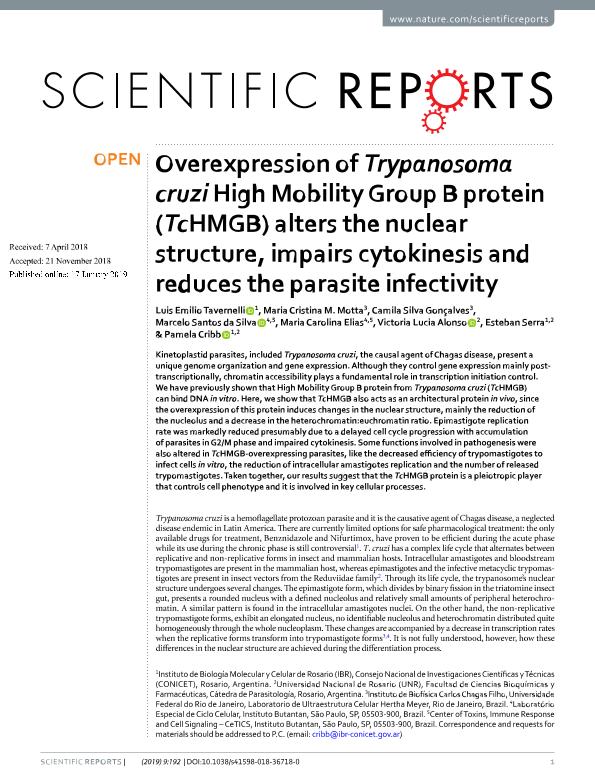Artículo
Overexpression of Trypanosoma cruzi High Mobility Group B protein (TcHMGB) alters the nuclear structure, impairs cytokinesis and reduces the parasite infectivity
Tavernelli, Luis Emilio ; Motta, Maria Cristina M.; Gonçalves, Camila Silva; da Silva, Marcelo Santos; Elias, Maria Carolina; Alonso, Victoria Lucia
; Motta, Maria Cristina M.; Gonçalves, Camila Silva; da Silva, Marcelo Santos; Elias, Maria Carolina; Alonso, Victoria Lucia ; Serra, Esteban Carlos
; Serra, Esteban Carlos ; Cribb, Pamela
; Cribb, Pamela
 ; Motta, Maria Cristina M.; Gonçalves, Camila Silva; da Silva, Marcelo Santos; Elias, Maria Carolina; Alonso, Victoria Lucia
; Motta, Maria Cristina M.; Gonçalves, Camila Silva; da Silva, Marcelo Santos; Elias, Maria Carolina; Alonso, Victoria Lucia ; Serra, Esteban Carlos
; Serra, Esteban Carlos ; Cribb, Pamela
; Cribb, Pamela
Fecha de publicación:
01/2019
Editorial:
Nature Publishing Group
Revista:
Scientific Reports
e-ISSN:
2045-2322
Idioma:
Inglés
Tipo de recurso:
Artículo publicado
Clasificación temática:
Resumen
Kinetoplastid parasites, included Trypanosoma cruzi, the causal agent of Chagas disease, present a unique genome organization and gene expression. Although they control gene expression mainly posttranscriptionally, chromatin accessibility plays a fundamental role in transcription initiation control. We have previously shown that High Mobility Group B protein from Trypanosoma cruzi (TcHMGB) can bind DNA in vitro. Here, we show that TcHMGB also acts as an architectural protein in vivo, since the overexpression of this protein induces changes in the nuclear structure, mainly the reduction of the nucleolus and a decrease in the heterochromatin:euchromatin ratio. Epimastigote replication rate was markedly reduced presumably due to a delayed cell cycle progression with accumulation of parasites in G2/M phase and impaired cytokinesis. Some functions involved in pathogenesis were also altered in TcHMGB-overexpressing parasites, like the decreased efciency of trypomastigotes to infect cells in vitro, the reduction of intracellular amastigotes replication and the number of released trypomastigotes. Taken together, our results suggest that the TcHMGB protein is a pleiotropic player that controls cell phenotype and it is involved in key cellular processes.
Palabras clave:
TRYPANSOMA CRUZI
,
HIGH MOBILITY GROUP B
,
CHROMATIN
,
CHAGAS DISEASE
Archivos asociados
Licencia
Identificadores
Colecciones
Articulos(IBR)
Articulos de INST.DE BIOLOGIA MOLECULAR Y CELULAR DE ROSARIO
Articulos de INST.DE BIOLOGIA MOLECULAR Y CELULAR DE ROSARIO
Citación
Tavernelli, Luis Emilio; Motta, Maria Cristina M.; Gonçalves, Camila Silva; da Silva, Marcelo Santos; Elias, Maria Carolina; et al.; Overexpression of Trypanosoma cruzi High Mobility Group B protein (TcHMGB) alters the nuclear structure, impairs cytokinesis and reduces the parasite infectivity; Nature Publishing Group; Scientific Reports; 9; 192; 1-2019; 1-16
Compartir
Altmétricas



